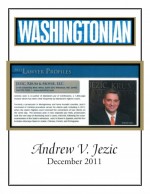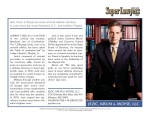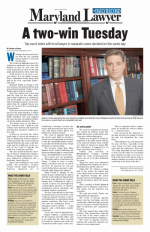
Link To Article
St. John Barned-Smith,
Posted: 12/12/2013 2:32 PM
Who was Joseph R. Urrutia — a dangerous career criminal or a man overcoming an addiction-filled past?
Defense attorneys and prosecutors wrangled over that question Thursday, before a Montgomery County Circuit Court judge sentenced Urrutia to eight years in prison on armed robbery charges.
In January, police arrested Urrutia, 48, of Benson Terrace, and charged him with robbing a Wheaton convenience store and a Capital One bank a few hundred feet apart on Georgia Avenue.
According to prosecutors, Urrutia was a “major career criminal,” with 35 arrests and 25 past convictions. Urrutia stormed into a local business wearing a balaclava — a mask covering most of his head and face — and sunglasses and holding a gun, then assaulted a 62-year-old shopkeeper, according to Assistant State’s Attorney Eric J. Nee.
Soon after, Urrutia robbed the Capital One bank branch, court records show.
Police arrested Urrutia the same day in a barbershop nearby. He was covered in red ink from exploded dye packs that were in bags of money from the bank, police records show.
“He has to prove to the parole board that he’s not a threat to society,” Nee said, asking that Urrutia receive a 16-year sentence.
Urrutia’s attorney, Andrew V. Jezic, said Urrutia’s actions stemmed from a childhood made brutal by abusive parents and from the trauma of watching his twin brother shot to death in front of him.
Despite the dozens of arrests his client had incurred, Jezic said for the most part, Urrutia had been a non-violent offender with convictions for disorderly conduct and loitering.
“He is not the monster the list of charges makes him out to be,” Jezic said.
He said Urrutia had tried to use his time in jail productively by attending therapy and addiction-treatment programs, working as a food preparer, and trying to obtain his GED.
Urrutia, Jezic said, turned his life around after marrying his wife, Nilda, in 2007.
“This is not someone who deep in their soul wants to live an assaultive … life,” he said.
In court, Nilda Urrutia said she married Urrutia — who she had known in her youth — while recuperating in Washington, D.C., after being flown from Iraq in 2003.
He had cared for her and supported her through the many surgeries she had to treat her war wounds, she said.
“He’s been my rock,” she said.
He started to turn his life around, she said, but descended into the grips of addiction to Oxycontin he had been prescribed for back pain.
“Things in the house started disappearing,” she told Mason, at times breaking down as she recalled how he sold her jewelry to fund his drug habit.
“What he did was so stupid and idiotic. I’m so sorry for what he did,” she said.
Joseph Urrutia, who pleaded guilty to two counts of armed robbery in July, said he committed the robberies in part because he hadn’t believed he was smart enough to get a normal job. It wasn’t until marrying Nilda, he said, that he finally began to believe in himself.
In apologizing for the robberies and everyone who has been affect, he said, “I know I impacted their lives.”
As he imposed the sentence, Mason noted Urrutia’s past and the trauma it had caused. “I can’t ignore the crimes you committed,” he said.
Urrutia likely would be eligible for parole in four years, Mason said, calling the sentence a “last opportunity.”
“If you don’t come to grips with your addiction, if you don’t get the help you need … if you come back before the courts … you may spend the rest of your life in jail,” he said.
sjbsmith@gazette.net






